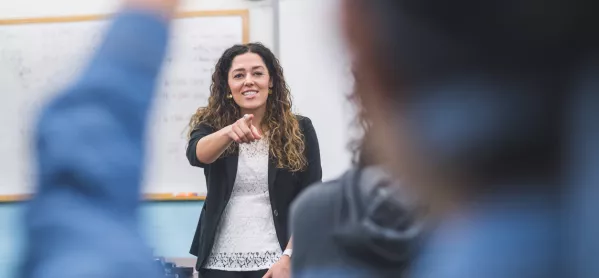4 tips for managing behaviour on the return to school

As we look forward to schools reopening fully, the immense pressure that teachers have been under is only getting more intense. After a year of lockdowns and disrupted learning, the prospect of being back in the classroom is another upheaval.
There’s so much that we can’t control at the moment - and I’m not just talking about what we see on the news - and this will be the case when we’re back in school, too.
Our classrooms will be different. When we were back in September, we couldn’t walk among our students, have a quiet word or ask them to move seats. We couldn’t give them time-outs easily and detentions became a logistical nightmare.
Behaviour will also look different when we return. Many students may have experienced trauma and loss in the past year. Some will find it difficult to go back into the highly structured environment of a classroom after having experienced a relatively high degree of freedom. This may result in a rise in low-level disruption. So how can we tackle it while still being sensitive to our students’ circumstances?
Schools reopening: Managing behaviour
The answer is, as with many other challenges in life, to focus on what we control, rather than on what we can’t. Here are a few practical ideas to hold on to when managing behaviour in this new era:
Knowledge is power
You know your class well. You can easily get your hands on your student information, you have clear seating plans annotated with specific learning needs and quality first teaching ideas. What’s missing now is information on what has happened to our students and their learning in the past year. How we get this effectively is a difficult question, as Professor Rob Coe explains:
“Effective granular assessments, like retrieval quizzes, can hold the attendant benefit of being low stakes, which can help teachers re-establish teaching the school curriculum without the potential stresses that can attend mock exam-type assessments.”
As an alternative, asking students to assess their perceptions of what they know, though less accurate, can be useful in providing insights into how well prepared they feel, and what impact 2020 has had on their understanding.
Focus on skills
Some of our students will not only be missing key knowledge but also key skills: listening, turn-taking and resilience, to name but a few. Some will not have experienced a traditional transition into their next phase of schooling and will not have had enough time to absorb new routines and practices.
We will need to regroup and re-establish skills, expectations and routines. Be very deliberate about this. Spend some time clarifying in your mind what it is that students need in your lessons.
Decide how and when you will teach this and be ready to invest time and effort into it. Skills as simple as completing independent practice in silence, or working productively with a partner, for example, can be taught, practised and celebrated as a class. The investment will pay off in the long term.
Stick to your guns
This is a time when tactical ignoring can be a valid strategy. We will certainly have to be patient in the months to come, as we have been during the months of online teaching. Having said this, it is crucial for us to decide what our non-negotiables are and that we are seen challenging anyone who doesn’t abide by them.
I, for example, draw the line at respect, and will consistently chase up any lack of it. Students will soon know that we mean business, that action means consequence, and many of them will cease testing us.
Be flexible
If blended and online teaching have taught us anything, it’s that with the best of intentions, there will be times when things don’t go our way.
When this happens - and it happens to us all - it’s important that we have a practised, in-control, calm persona to show our students. Before the lesson, visualise what will happen, what you will do, what students will do. Will they have and know what they need for each stage? What could go wrong and how could it be fixed?
Remember that we are strongest when we are flexible. Be prepared to change the plan and opt for activities that you know work, or to abandon the plan altogether if you see that it doesn’t work. Listen to your students and react to their needs. More importantly, forgive yourself if you don’t cover what you intended to.
Above all, remember that you’re doing well, that you’re there for students who are braving a pandemic too, and that, above all, neither they nor we, can do without you.
Elena Diaz is an experienced middle leader in the North East of England
You need a Tes subscription to read this article
Subscribe now to read this article and get other subscriber-only content:
- Unlimited access to all Tes magazine content
- Exclusive subscriber-only stories
- Award-winning email newsletters
Already a subscriber? Log in
You need a subscription to read this article
Subscribe now to read this article and get other subscriber-only content, including:
- Unlimited access to all Tes magazine content
- Exclusive subscriber-only stories
- Award-winning email newsletters